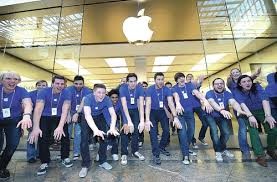Happy and engaged employees make better brand ambassadors!
 While Nestle India the big food maker is battling its biggest crisis in India, it has asked its employees and all their families and friends to become “valued brand ambassadors” for the company in midst of the company’s battle regarding discussions in the public domain on monosodium glutamate (MSG) in Maggi. In an email to employees, chairman and managing director Etienne Benet, a Swiss-French national who is hardly seen in public, said their role “at times like this is more important than ever……”
While Nestle India the big food maker is battling its biggest crisis in India, it has asked its employees and all their families and friends to become “valued brand ambassadors” for the company in midst of the company’s battle regarding discussions in the public domain on monosodium glutamate (MSG) in Maggi. In an email to employees, chairman and managing director Etienne Benet, a Swiss-French national who is hardly seen in public, said their role “at times like this is more important than ever……”
The point is why only in crisis, even in peaceful times a company can rely strongly on their loyal and engaged employees instead of hiring expensive brand ambassadors for image building. If a company wants to get extraordinary loyalty from its employees, it needs to take initiative in creating a mutual sense of that relationship. After all, engaged employees build stronger brands. No two thoughts on it.
Though, most companies focus all their branding efforts on marketing activities such as advertising campaigns, corporate communication, attractive packaging etc, yet one of the most powerful assets a company has is – its people. This is regardless of which industry the company is in, for building a strong brand requires that all employees feel connected to the corporate brand and understand their role in turning brand aspirations into reality. The earlier this is understood, it is better for the company. It should aspire to motivate its talent pool into turning brand ambassadors for its business health because employees rank higher in public trust than a firm’s PR department, CEO, board of directors or Founder. Employees are the most credible source of information regarding the organization. The frontline staffs give a glimpse of the organization’s culture and integrity. When a customer interacts with one of the frontline employees, or with the work produced by behind-the-scenes employees, everything the company’s PR and marketing departments have done will be put to the test immediately.
To build a strong corporate brand, the company must invest in its employees who are thoroughly engaged, connected and committed. Scarlett Surveys is the global provider of the best-practice AER Employee Engagement Survey System™ used by hundreds of organizations to intelligently manage employee engagement.
Scarlett Surveys International defines Employee Engagement as “a measurable degree of an employee’s positive or negative emotional attachment to their job, colleagues and organization that profoundly influences their willingness to learn and perform at work.”
This is where leadership comes into picture. The leaders must lead by stetting examples and embody promises made. When customers deal with an organization, they deal with a mix of employees from various ranks and cadre. A customer anticipates doing business with a company only when the employees look confident, happy and positive.
Attrition is not good for any company’s health. If a high number of employees are leaving then something is wrong; the question is what, and what can be done to improve it. Organizations must foster good work atmosphere because employees who genuinely love, enjoy, and feel connected to their jobs are the ones who best represent the company they work for. I hope this makes sense, doesn’t it? You will see those employees are the most engaged, the ones who like coming into work every day and are the most likely to say positive things about your company on social media. This is why it’s important to leverage these engaged employees as ambassadors for a company’s brand.
However, in the age of social media, nothing is hidden; hence, it’s not uncommon to see employees badmouthing their organizations – sometimes subtly and sometimes openly. So why do loyal and engaged employees make the very best brand ambassadors? Quite simply, the visibility that engaged employees offer when talking publicly about the brand they represent is something that can’t be imitated emotionally and genuinely by best of the hired models or any outside source. Consumers can tell when employees are being sincere about their passion for what they do and for their company.
Engaged employees sincerely love the company they work for so they are more likely to spread that love on social media. They can organically increase brand awareness on social by sharing news and updates with their friends, fans, and family. They love their company brands so much that they can easily answer customer questions and comments on social, acting as your first line of communication. They provide a relevant, human face for the company they work for, and hence, they can create authentic, compelling content that drives traffic and increases social engagement.
 At Starbucks at a point in time, some of their executives visited their coffee shops and noticed that good employees were losing their poise when faced with agitated customers. Instead of coming down on the individual employees, they developed new training material that eliminated the stress of these situations. The executives at Starbucks found that when they empowered their employees with tools they needed to serve customers happily, their employees gained their smiles back.
At Starbucks at a point in time, some of their executives visited their coffee shops and noticed that good employees were losing their poise when faced with agitated customers. Instead of coming down on the individual employees, they developed new training material that eliminated the stress of these situations. The executives at Starbucks found that when they empowered their employees with tools they needed to serve customers happily, their employees gained their smiles back.
Do you know friends that Eastman Kodak is one such company in world which has the longest average tenure for employees at 20 years? This Centurion old company gives the excitement of a strong core business and brand that is recognized and respected in virtually every country around the world. It enables its employees an effective organization, with strong leaders, engaged employees and winning culture.
The key to employee engagement lies in providing growth opportunities, varied roles and empowerment. In India, ITC is one such organization, in which, its senior executives hardly ever quit. Attrition at senior levels is less than five per cent and for frontline staff around 10 per cent. Naturally, ITC and its Agro Tech rarely hire from outside, preferring to promote insiders. ITC also backs employee initiatives. The company allows people to incubate businesses. The team in charge of the paper business suggested getting into greeting cards. A few years later they realised they were not getting anywhere and came back with a proposal to enter office stationery. The company placed a second bet on them. This time it hit the jackpot. In four years, office stationery has grown into Rs 500-crore business for ITC.
A great company culture breeds happy people. Those happy people who connect with their roles and the company become engaged employees. Let us not underestimate role of each employee in an organization from the sweeper to the CEO each one has a big role to play.
 Organization must deliver the promise to employees. “When employees feel that the company takes their interest to heart, and then the employees will take company interests to heart,” says Dr. Nelson, a clinical psychologist, bestselling author and business trial consultant. She mentions in her book an example: in 2011 after wrapping up a record-setting year, new Apple Inc. CEO Tim Cook rewarded employees by giving them paid vacation through the week of Thanksgiving. In a memo to employees Cook wrote, “In recognition of the hard work you’ve put in this year, we’re going to take some extra time off for Thanksgiving. We will shut down with pay on November 21, 22 and 23 so our teams can spend the entire week with their families and friends.” This act of Cook motivated the employees to no limit.
Organization must deliver the promise to employees. “When employees feel that the company takes their interest to heart, and then the employees will take company interests to heart,” says Dr. Nelson, a clinical psychologist, bestselling author and business trial consultant. She mentions in her book an example: in 2011 after wrapping up a record-setting year, new Apple Inc. CEO Tim Cook rewarded employees by giving them paid vacation through the week of Thanksgiving. In a memo to employees Cook wrote, “In recognition of the hard work you’ve put in this year, we’re going to take some extra time off for Thanksgiving. We will shut down with pay on November 21, 22 and 23 so our teams can spend the entire week with their families and friends.” This act of Cook motivated the employees to no limit.
Similarly, Proctor & Gamble also pays back company success to employees through extra paid days off. “It ate a little bit of their bottom line, a little bit from the stockholders, but oh my God what it bought them in employee loyalty and productivity,” says Dr. Nelson. She writes “If you’re doing well, share. And for God sake, don’t let your executives walk out with a bonus if the company is not doing well. People don’t mind that execs make money, they mind if it’s exorbitant if the company is not doing well.” She says in her book that even when the company is not doing well the information should be shared with its employees. Employees accept realities than being kept in dark.
Make your employees your brand ambassadors.












































